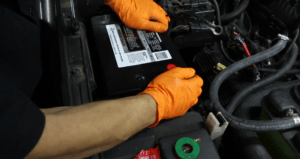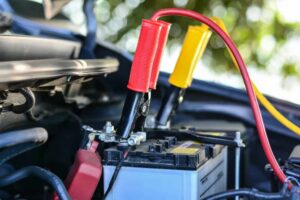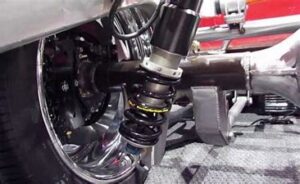In the world of autos, car battery corrosion is like the sneaky troublemaker who quietly slides onto your battery terminals and wreaks havoc when you least expect it. Imagine this: this white, powdery substance that has taken up residence on your battery is the reason your automobile won’t start on a busy morning. However, why does this bothersome corrosion seem to occur at the most inconvenient moments and what causes it specifically? Fundamentally, the corrosion of automobile batteries arises from an unfavourable chemical interaction between the sulfuric acid in your battery and the metal terminals. This dance produces a chemical that appears like it belongs in a science fiction film, but it can seriously harm the electrical system of your car.

Even though the word “corrosion” may seem intimidating, knowing what causes it will enable you to take easy precautions against it.
In basic and straightforward terminology, we’ll solve the puzzle of what causes car battery corrosion in this article. We’ll explore the elements that turn your battery terminals into a breeding ground for this unwanted visitor, arming you with the information you need to keep your car running smoothly and steer clear of the hassle that comes with a corroded battery. So grab a seat, because we are going to take you on a journey to understand the causes of car battery corrosion and provide you with the resources you need to solve it.
Table of Contents
Meaning Of A Car Battery Corrosion In Detail
Additionally, before we delve into what causes car battery corrosion. Firstly, we’ll understand what it means in detail. corrosion in automobile batteries is the unseen enemy that lurks around the battery connections and can be a big problem. It looks like a white, powdery material. The energy required to start the engine and run other electrical systems in your car comes from the battery, which you might think of as its heart. Now, when there’s a little glitch in this heart, corrosion occurs. Sulfuric acid, which is necessary for producing power, is among the mixture of chemicals found inside the battery. On occasion, though, this acid combines with the battery’s metal terminals to produce a white, powder-like material.

However, this powdery substance isn’t good; it corrodes and can interfere with your car’s electrical system. Therefore, you are observing automobile battery corrosion in action when you notice the white powder accumulating on your battery connections. It makes it more difficult for your automobile to start and run correctly, much like corrosion does to your car’s battery. To resolve this problem and keep your automobile running and its heart healthy, you need to know why it occurs and figure out easy ways to maintain the cleanliness of your battery connections.
What Causes Car Battery Corrosion?
A chemical dance between the sulfuric acid in the car battery and the metal components commonly results in car battery corrosion, that annoying white coating on your battery terminals. By being aware of the typical reasons, you can prevent problems before they arise and maintain the optimal performance of your car.
1. Extremes Of Temperature:
Imagine your car being exposed to bitterly cold winter temperatures or sweltering summer heat. These temperature variations can hasten the chemical reactions that cause rust. The battery has to work harder due to the extreme weather, which speeds up the creation of the unpleasant white substance on the terminals.

2. Excessive Or Insufficient Charging:
Your automobile battery performs best when it is charged within the ideal range, much like a fine balance on a seesaw. Electrolyte imbalances result from upsetting this delicate equilibrium by either overcharging or undercharging. This mismatch not only impairs the battery’s efficiency but also fosters a corrosion-prone environment.
3. Roadside Pollutants:
Although pollutants such as road salt and others that are stirred up during your travels may appear innocuous, they are part of the corrosion spectacle. When these materials come into touch with the battery terminals, they play a part in the chemical processes that result in the accumulation of white powder. You may reduce this risk by keeping an eye on your surroundings and cleaning your batteries regularly.
4. Wear And Age:
Car batteries have a lifespan, just like anything else. They are more susceptible to corrosion as they get older and wear out. The internal battery components experience wear and strain, which exacerbates the chemical reactions leading to corrosion. As your car ages, routine battery checks become increasingly important.

5. Battery Terminal Looseness:
Consider the handshake that exists between your battery and the rest of your car when you look at your battery connectors. Electrical resistance, heat production, and yes, corrosion, can result from a loose connection. This problem can be avoided by routinely verifying that the terminals are securely fastened.
It is therefore similar to having a map to navigate the terrain of dependable vehicle performance to be aware of these typical causes of car battery corrosion. Through preventive maintenance and routine upkeep, you can greatly lessen the chance of having to deal with the inconvenience of a car battery that has corroded.
How To Fix The Corroded Car Battery In The Simple Steps?
Corrosion in car batteries can be quite annoying, but worry not! Your car can continue to operate smoothly and your battery terminals clean with a few easy-to-apply remedies.
1. Continual Cleaning:
Frequent cleaning is one of the simplest strategies to fight corrosion. To make a cleaning solution, combine a cup of water and one spoonful of baking soda. To remove the white, powdery buildup on the terminals, use an old toothbrush or a battery brush specifically made for that purpose. By neutralizing the acidic corrosion, this mixture helps stop it from spreading.

2. Use Terminal Grease Or Petroleum Jelly:
Apply a thin coating of speciality terminal grease or petroleum jelly to the terminals after cleaning them. This serves as a barrier to protect the metal from airborne corrosives and moisture. The greasy layer keeps your battery terminals in excellent condition by preventing further corrosion.
3. Terminal Pads That Resist Corrosion:
The use of terminal pads resistant to corrosion is a possibility. Your battery connections will have an additional layer of protection from these pads because they are composed of materials that are less prone to corrosion. They can greatly lower the chance of corrosion accumulation and are simple to install.
4. Appropriate Methods Of Charging:
To avoid overcharging or undercharging your battery, use recommended charging procedures. Purchase a high-quality battery charger that will automatically modify the charging rate of the battery’s requirements. Refrain from starting your car too often since incorrect jumps might cause voltage spikes that exacerbate corrosion.

5. Inspect And Strengthen Wires:
Make sure you periodically check your battery connections for corrosion or looseness. Use a tool to tighten the connections if you find any problems. Tight connections minimize corrosion and guarantee good electrical flow.
Therefore, to put it briefly, preventive maintenance can significantly reduce the risk of corrosion in automobile batteries. You can improve the dependability of your car, increase the lifespan of your battery, and say goodbye to the aggravation that comes with unplanned battery problems by adopting these easy fixes into your daily routine. Never forget that a little effort now can prevent a major headache later!
Conclusion:
Therefore, a common enemy in the complex dance of auto repair is battery corrosion. But with enough information, we can defeat this enemy. Overcharging, extreme temperatures, and outside impurities all have an impact, but our defence is maintained by routine cleaning, safety precautions, and prudent charging techniques. We clear the path for dependable starts and more comfortable rides by comprehending what causes car battery corrosion and resolving these causes. Now let’s wave goodbye to the white powder blues and head toward a future where our car batteries shine brightly, free from corrosion, guaranteeing that our cars stay reliable allies on the road of life.
![You are currently viewing What Causes Car Battery Corrosion? [Fully Explained]](https://hydraulicsuspension.com/wp-content/uploads/2024/02/how-to-remove-battery-corrosion.jpg)


